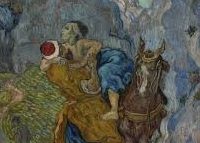Christianity is full of wonderful stories of service of the strangers. One concerns St Oswald who is very close to our hearts; it goes like this. One Easter, when St Aidan was dining with St Oswald, a servant entered to say that there were many poor outside the gate seeking alms, Oswald took up a great silver dish and filled it with all sorts of foods from the royal table, and gave it to the steward. He told him to give out the food and then break the silver plate into pieces to hand out to the crowd as well. Aidan took the king’s right hand and said, “May this hand never decay”, his blessing was fulfilled, for after St Oswald’s death, his incorrupt hand was kept as a sacred relic.
Another story concerns St Martin of Tours whose feast day is 11th November – Remembrance Day – very apt as Martin was a Soldier. It is said that, on a bitterly cold day, Martin met a poor man, almost naked, trembling in the cold and begging at the city gate. Martin had nothing but his weapons and his clothes. He drew his sword, cut his cloak into two pieces, gave one to the beggar and wrapped himself in the other half. Some of the bystanders laughed at his now odd appearance; others were ashamed at not having relieved the man’s misery. That night in his sleep Martin saw Christ dressed in the half of the garment he had given away, and heard him say, “Martin has covered me with his garment.”
This concern and care for those in need is central to our faith. This arises from Jesus’ teaching and example – we follow a man who fed and had great concern for the poor and taught us that whatever we do for the least of our brothers and sisters we do also for him. He also taught us that, on this we will be held to account on the day of judgement. Carrot or stick, example or warning of judgement, Jesus taught us to help and serve others.
Other faiths have similar beliefs: for example, charity is the third of the five pillars of Islam. My understanding is that, in Ramadan, faithful Muslims give away a portion of their wealth. Did you know that, in the fairly recent past, Ramadan giving has been offered to this church?
The parable of the Good Samaritan is so familiar that we have half stop listening to it. We can learn that we must serve and love even those who are different from us. In the time of a sharp rise of racist incidents following the Brexit vote, the story of the Good Samaritan is a timely reminder that racist and abusive behaviour is completely unacceptable for those who call themselves Christians.
But this parable teaches us something much more profound and difficult, because, Jesus twists his answer to the question ‘who is my neighbour?’ If the story had gone along the lines of a faithful Jew who had gone out of his or her way to help a Samaritan, beaten up and dying, on the road it would have been quite straightforward. But that’s not how the story goes. Jesus tells the story the other way round – it is the Samaritan who helps the Jewish traveller, not the other way around.
What is Jesus getting at here? What is he trying to tell us.
We have to remind ourselves that Jews and Samaritans were old enemies. It is even possible that the answer to Jesus’ question ‘Which of these three, do you think, was a neighbour to the man who fell into the hands of the robbers?’ – ‘The one who showed him mercy’ is a refusal even to say the word ‘The Samaritan’.
Jesus’ story, his question and the answer he gave offer us a much more profound challenge than helping people or being nice to them. In this story he is challenging us to shift our whole world-view, cast off our security blanket, and too look afresh at the world and its peoples. Jesus is asking us to look people of other faiths and cultures, other languages and colours, and see their humanity. He is asking us to see their capacity for doing good. To see them as moral people, as we ourselves are.
This story is about an encounter – an encounter between two people from different faiths, nations, cultures which turns out to be an encounter between two human beings.
It is exactly the sort of story which doesn’t get told in most newspapers. The news we hear, day after day, is about black people shooting white people, Muslims killing Christians, refugee men raping western women, armies of different nations and cultures locked in deadly combat, straight people killing gay people in a night club. The narrative is always the same and the common denominator is ‘difference’ – humans kill those who are different to themselves. It is always ‘them and us’ – difference.
Jesus’ story is more challenging than ever just now, because the potential for violence and destruction is greater than ever. Jesus is telling us ‘there is no ‘them and us’ – only ‘we’. We humans. We children of God. We who share God’s earth.
It us when we discover this small word ‘we’ that everything begins to change. Racism is easy in the abstract – when we say ‘they’ -they are doing this, they behave that, they think the other. It is when we become ‘we’ that we begin to see that other people are pretty much like ourselves – ordinary human beings going about life pretty much as we do, with similar concerns and problems, joys and sorrows.
Yes, there will always be extremists and people who prefer violence to peace. But there are many many more peaceful people in the world, that there are people of violence. There are more people in the world who will stop to help someone on the road than drive past and look the other way. But somehow we have stopped recognising each other. We have been conned into thinking that it’s our duty to dislike, reject or hate those who are different to us.
The parable of the Good Samaritan challenges us to think again, to look for the humanity we share, the goodness we are all capable of, and to see in others the image of the God who made and loves us all. This is a story of encounter, and until we encounter each other we will never be able to help or to trust. Dare we do this? Dare we encounter brothers and sisters who appear so different but are really very like us? Until we do this, the world will continue to be enveloped in violence, hatred and mistrust. It’s up to us – each one of us, to see humanity in others so to live this parable of two very different people whose cultures had been at war for centuries, who discovered their joint humanity in a time of need.





